Chapter IX Publicity, Training and Academic Activities
1 Publicity
On the basis of improving the understanding of policies and theories and developing the publicity expertise, the publicity work was carried out to serve the overall policies and guidelines of the Chinese Communist Party and the State, and the important measures adopted and activities organized by the SIPO in the field of intellectual property. the SIPO strengthened the direction of the local publicity work and paid attention to combining the central and local resources and advantages together to give full play to both. The publicity work was further strengthened through the cooperation and coordination of associated departments. According to the different targets for publicity, the publicity work was distinguished based on content, level and method, which achieved better social effects.
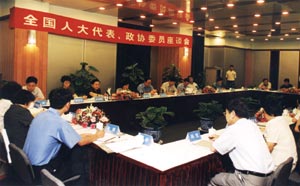
Discussion with Representatives of the NPC and CPPCC
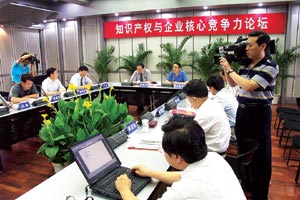
The Forum on Intellectual Property and Core Competitiveness of Enterprises co-organized by the SIPO and Economy Daily
First, supported by the leaders of the Office, the publicity work was carried out to closely support the important activities of the SIPO through drawing experiences and improving qualities. For example, one important activity was the SIPO's co-organization of the Sino-African Intellectual Property Forum and the Second International Forum on Creativity and Invention with the WIPO so to elaborate on the stand and viewpoint of the Chinese Government on intellectual property. More people now know about the SIPO or better understood its function through the publicity on the Agreement of Cooperation Framework between the SIPO and the WIPO. The publicity report on the National Conference of Directors of Local IP Administrations made the IP work known to the public. Public awareness of the IP protection awareness was raised through broadcasting special programs and cartoons related to IP protection on CCTV.
Second, the publicity was strengthened through cooperation with other associated agencies. For example, to demonstrate the creativity and elegance of Chinese women, and to encourage their enthusiasm on innovation, the SIPO cooperated with the National Female Federation and China Invention Association to co-organize the Selection of Woman Inventors in the New Century, which had been given a full report. In order to discuss the influence of the WTO on our national economic development, a comprehensive report was prepared on the Seminar of Intellectual Property and Core Competitiveness co-organized by the SIPO and the Economy Daily. In order to foster the Youth's interests in science, to encourage their invention and creation, and to raise their awareness of protecting IPRs, the SIPO together with the Communist Youth League, the Ministry of Education, the Ministry of Science and Technology, the China Academy of Science, and the National Student Federation, initiated the First National "Sci-Star" TV Competition of the Youth. For the purpose of strengthening agriculture, promoting agricultural industrialization, and increasing the income of peasants, the SIPO and the Central TV Broadcasting School of Agriculture, taking advantage of the Yangling Agricultural Patent Information Center, produced a series focusing on patented agricultural technology and farmers in the western region, which will be broadcasted on CCTV in 2003.
Third, through organizing working meetings and workshops on publicity and circulating documents to arrange work and strengthen direction on local publicity work, our publicity work was consolidated. Meanwhile, the local publicity work was improved, and thus advantageously combined the central and local resources together to give full play to these efforts. Some TV programs such as the Patents of Ordinaries on Guangxi TV and the Golden Ideas on Anhui TV were generated in this way.
Fourth, according to the different targets of publicity, the publicity work was distinguished based on content, level and method, which achieved better social effects. For example, there was a TV special celebrating 4.26 the World Intellectual Property Day and a cartoon VCD on the ABC's of IP, which were both educational and entertaining, a special program of Innovation Stars of the Youth, news and special reports on IP cases, and a special series on IP for farmers and agricultural technicians.
In addition, the Public Survey on IP knowledge organized by the SIPO showed that IP awareness of the public was enhanced, which was kept pace with optimizing and adjusting the national economic structure, developing productivity, and increasing national income. The survey, which itself promoted public awareness of the importance of IP protection, also showed that the publicity of media was also an important element in raising public awareness.
2. Training
(1) Social Training
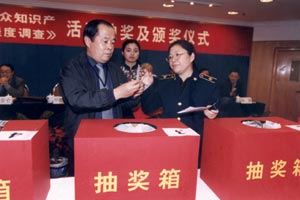
Deputy Commissioner Xing Shengcai was drawing a lottery for participants at the ceremony.
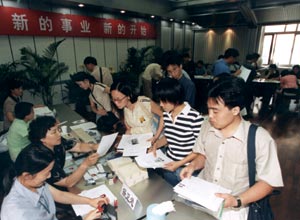
First Day for New Examiners
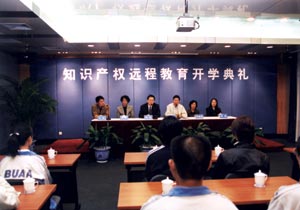
On October 16, Deputy Commissioner Lin Binghui attended the ceremony for providing Chinese distance IP courses via network.
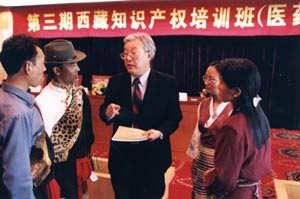
Deputy Commissioner Yang Zhengwu was exchanging views with Tibet technicians on the protection of Tibet medicines and intellectual property.
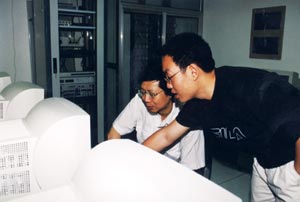
On July 17, Deputy Commissioner Lin Binghui (left) visited the China Intellectual Property Training Center for its newly estab lished website.
In 2002, to meet the needs of the developing situation of IP protection after China's accession to the WTO, the SIPO strengthened IP training, especially with respect to officials, heads of enterprises and institutes, technicians and patent workers, organized training on IP laws and regulations, trade-related IP rules, patent strategies, IP protection in high-tech fields and so on. the SIPO further enhanced the IP awareness of officials at all levels and heads of enterprises and institutes, which played a positive role in improving the capability and level of IP protection and in fostering IP talents with high quality. In 2002, the SIPO organized twenty-nine IP training courses of all kinds for the public.
The IP protection training courses on industries of electronics, medicine and so on provided policy direction for enterprises and institutes on reasonably applying rules under the WTO and the TRIPs agreement and patent strategies, positively facing challenges of the WTO, strengthening and improving IP protection, and enhancing the productivity of independently owned IPRs.
To implement the strategy of "Developing the Western region", the IP Strategy Training Seminar for Large Enterprises in the Western region was held to further raise awareness of the importance of the IP protection for the enterprises in the Western region and promote the construction of the IP system in that area.
The training courses for Directors of local IP administrations focused on the new international and domestic situation and tasks faced by our IP work after China's accession to the WTO, and provided theoretical and political direction on the further development of local IP work.
The training seminar for IP teachers from the Party schools and economic administration colleges at the provincial level was organized to expand the channels of IP training, to foster a number of IP teachers for training institutes of the CPC, and to promote IP training work for leading cadres of the Party and Government.
The training courses for local IP teachers continued to be organized to foster local IP teaching talents in demand and to further increase the number of IP trainers.
Meanwhile, the SIPO aroused local enthusiasm to actively organize IP training programs focusing on local officials, leaders, and staff responsible for IP work of large and medium-sized enterprises in high-tech zones. More than ninety training courses were organized, which greatly enhanced the awareness of the importance of IP protection in local governments at all levels, improved the quality and level of staff responsible for IP work, and promoted the development of local IP work.
To meet the needs of IP training work, the SIPO strengthened the compilation of IP training materials. Under the direction of the Organization Ministry of the Central Committee of the CPC, the IP Reading Book for Leading Cadres co-compiled by the SIPO and related departments for leading cadres at all levels was completed, which will serve as a high quality IP reading book for leading cadres at all levels.
In addition, a total of eighteen persons were selected from the SIPO and local IP administrations to participate in the medium and long term training on IP laws or public administration in foreign countries in 2002.
(2) Training within the Office
To improve the quality of cadres and to strengthen the training of patent skill, in 2002, the SIPO arranged training and examination strictly according to the requirements on national civil servants, formulated the Training Plan of the SIPO from 2002 to 2005, and enhanced training for cadres.
A training course for sixteen weeks was organized for 326 new examiners, through which the new examiners mastered patent examination skill in a relatively short time.
To guarantee the smooth proceeding of training for new examiners and to foster a team of high-quality trainers, the SIPO also organized the EPOQUE Search Training Course for Future Trainers and Patent Examination Advanced Training Course for Future Trainers, which established a foundation for future training.
To meet the needs of fostering high quality and multi-disciplined talent, the SIPO organized the Japanese Oral Course, German Course and Advanced English Course for examiners, inviting outside experts to lecture. The Japanese Oral Course concluded successfully, through which trainees greatly improved their spoken Japanese.
Two WIPO IP Distance Learning Courses were organized, through which ninety-one persons obtained certificates issued by the WIPO at the end of 2002, and the EPO-the SIPO New Examiner Training Course was also organized in cooperation with the EPO.
The English language-training course was organized to improve the English level of staff members. To improve the organization and administration capability of leading cadres, the SIPO organized a training course on leading arts for new directors, which achieved good effects.
To implement the Opinions on Carrying out Training on Laws and Administration among Civil Servants in the Country co-issued by the Publicity Ministry of the Central Committee of the CPC, the Ministry of Personnel and the Ministry of Justice, the SIPO organized four training courses on laws and administrations focusing on the WTO and IP, Administration according to Law, Standards for Civil Servants and so forth, in which about 400 civil servants participated.
(3) Training Work of The China Intellectual Property Training Center (CIPTC)
The China Intellectual Property Training Center (CIPTC) established an IP distance learning platform through one year's efforts, offered the first course of IP Legal Basics, with 1129 persons registered, including persons from all provinces, autonomous regions and municipalities directly under the leadership of the Central Government, Taiwan and Hong Kong SAR, except for the Tibet autonomous region, which was also offered as a course selection at the Beijing Aviation and Space University.
The CIPTC organized forty-one training courses of all kinds in the year of 2002, in which more than 5000 trainees participated, including leading cadres at all levels, heads of enterprises and institutes, technicians, patent examiners, patent agents, and IP administrators, focusing on topics such as new IP laws and regulations, the TRIPs agreement of the WTO, new issues of patent examination and agent, patent strategies and IP protection in the field of advanced technologies. Meanwhile, experts and scholars from the SIPO, the National Copyright Administration, the Trademark Office of the State Administration for Industry and Commerce, the China Academy of Social Science, top universities and large enterprises were invited to present lectures. The training activities were well organized and received wide praise.
The CIPTC organized eight national IP training programs, four training programs for local IP administrations in the name of the SIPO, including the training seminar for IP teachers from the Party schools and economic administration colleges at the provincial level.
The CIPTC and China University of Political Science and Law co-organized the new round of post-graduate courses on civil and business laws, in which more than sixty persons from the SIPO, the Trademark Office, IP agencies and large enterprises participated. It was an important task for the CIPTC to train IP talents for Tibet to implement the Western Development Strategy. In 2002, the CIPTC organized the IP training seminar on medicine in Tibet. The CIPTC organized an IP training courses for leading cadres at the county level in seven provinces and autonomous regions, namely, Heilongjiang, Zhejiang, Henan, Hainan, Jilin, Shandong and Xinjiang, in which more than 350 leading cadres participated. The CIPTC and China Social Science Academy co-organized the IP Protection Seminar on Genetic Resources, Traditional Knowledge and Folklore, and the Seminar on Copyright Collective Management.
The WIPO-SIPO PCT Roving Seminar and the EPO-SIPO IP Seminar were held in the CIPTC. The CIPTC organized three terms of the Long Distance Learning Programs of the WIPO Worldwide Academy, in which more than 400 persons participated. The CIPTC received about 100 guests from IP institutes, universities and enterprises of Thailand, Japan, Austria, the United States, Korea, and the United Kingdom. The CIPTC and the Korean International IP Training Institute also reached a draft cooperation agreement.
To meet the needs of training IP talents, the second phase of the project for constructing a new training building of the CIPTC, covering 7000 m2 and with an investment of 29.5 million RMB, was initiated in September 2002.
(4) Practical Training of Patent Agents
To improve the practical expertise of patent agents, the SIPO organized four training courses respectively in Shenyang, Huangshan, Yichang and Hangzhou in 2002, in which about 800 persons participated.
(5) Training Patent Administrative Enforcement Staff
According to the Notice on Administration of Patent Administrative Enforcement Credentials, the SIPO organized a training course in Jiangxi in October 2002, in which about 100 enforcement staff members from the patent administrations of twenty-eight provinces, autonomous regions and municipalities directly under the leadership of the Central Government participated. About 700 enforcement staff members were trained respectively by the IP administrations of Heilongjiang, Sichuan, Guizhou, Guangdong, Jiangsu, Yunnan, Henan, Shandong and Beijing. All the qualified enforcement staff members would be awarded Enforcement Credentials by the SIPO.
3. Academic Activities
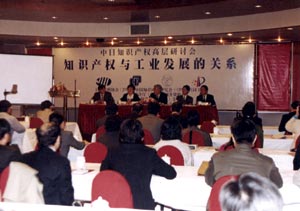
The Seminar
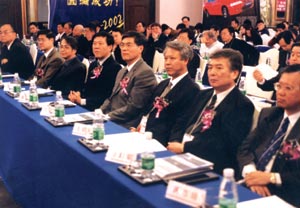
Deputy Commissioner Wu Boming attended the Forum
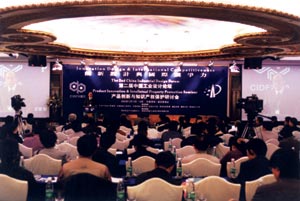
The Second China Industrial Design Forum - the Seminar on Innovation and Intellectual Property Protection
The China Intellectual Property Society (CIPS) held the 2nd Standing Committee Meeting of the Third Plenary Session of the CIPS to review the accomplishments since the Third Plenary Session and to discuss and pass the working plan for 2002.
On June 21, the CIPS organized a seminar on patent protection in Huairou, in which more than thirty representatives from administrations, courts and media participated.
On August 30, 2002, the Patent Committee of the CIPS organized the 3rd Academic Exchange Seminar of the SIPO in Beijing, with more than 150 participants. More than 100 papers were exchanged at the seminar, covering legal exploration, patent examination, IP administration, patent documentation and automation. At the seminar three papers were selected to receive the first prize, while five were awarded second prize and nine were awarded third prize.
From September 11 to 12, the CIPS organized the 2002 Mainland and Taiwan IP Seminar in Beijing, focusing on the newly revised patent law, trademark law, copyright law, and related topics of E-commerce and IP, and patent examination of Chinese traditional medicine.
From September 18 to 20, at the invitation of the CIPS, a delegation of the American IP law Association (AIPLA) visited China, met with Deputy Commissioner Wu Boming, and delivered lectures in Beijing.
From October 10 to 11, the CIPS and Japan Invention Association co-organized the Sino-Japanese IP Advanced Seminar in Beijing, on which Deputy Commissioner Yang Zhengwu delivered a speech. The seminar focused on the topics of IP in Business, Features of the IP Systems of Both Countries, and the Relationship between IP Protection and Industry Development. A total of eight Chinese and Japanese famous experts presented academic reports at the seminar, which were welcomed by the participants.
From November 18 to 26, at the invitation of the Japan Intellectual Property Association, a delegation of the CIPS visited Japan to make academic exchanges and achieved success with all the questions well answered by the Japanese experts from the government, courts and enterprises.
The CIPS edited and published six issues of the Intellectual Property magazine, one supplementary issue, and the Collection of IP Papers, to publicize and popularize IP legal knowledge.
2013-07-17 Print
Print